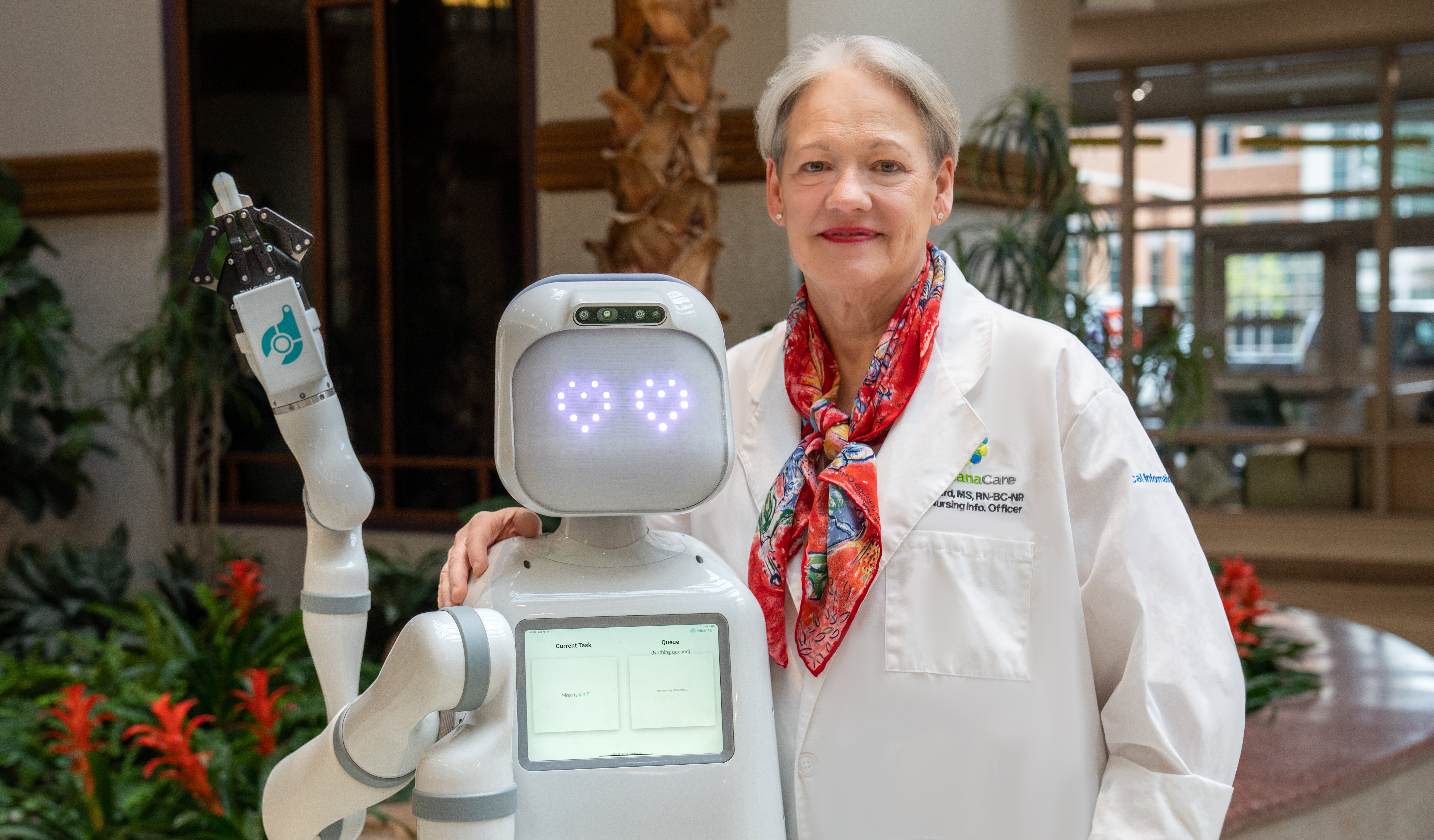Nurse Innovator Spotlight: Kat Collard
“I advocate for our nurses every day. I hear what they have to say, and I listen to what they are going through,” says Katherine “Kat” A. Collard, MS, RN-BC, NP, chief nursing informatics officer at ChristianaCare.
 What Kat hears from nurses is supported by research: nurses can spend up to 33 percent of their shifts on time-consuming but simple tasks such as dropping off lab specimens and picking up medications from the hospital pharmacy. Those non-nursing tasks take precious time away from nursing expertise in the delivery of complex patient care.
What Kat hears from nurses is supported by research: nurses can spend up to 33 percent of their shifts on time-consuming but simple tasks such as dropping off lab specimens and picking up medications from the hospital pharmacy. Those non-nursing tasks take precious time away from nursing expertise in the delivery of complex patient care.
Through innovative technology, she is making nurses’ lives better. Kat leads the initiative that brings collaborative robots or “cobots” to assist hospital nurses, pressed harder than ever since the COVID-19 pandemic.
Created by Diligent Robotics, Moxi the cobot makes deliveries and performs non-clinical tasks so nurses can spend more time with patients—research shows this improves patient outcomes. Kat is clear on the cobot’s role: Moxi is a helper, not a substitute for nurses. "Moxi is not going to replace nurses. It is an additional resource for nurses and their teams.”
With support from the American Nurses Foundation’s Reimagining Nursing Initiative, ChristianaCare is developing technology that will enable Moxi to connect directly to electronic health records (EHR). As nurses put orders in the system, Moxi will get that message and retrieve what is needed without nurses having to ask and wait. This further reduces the burden on care teams by anticipating what patients need and lessening nurses’ cognitive load. This integration is set to happen later this summer.
Understanding Nursing From the Inside Out
Kat began her nursing career in 1982 and has been at the forefront of innovation ever since. First, as a labor and delivery nurse at SUNY Stony Brook in New York, where she supported her team in creating a family-oriented method of childbirth that gave laboring parents more autonomy over their birthing experience.
Then the chief nursing officer asked Kat to step into the role of director of health care informatics. Kat remembers saying, “I can write prescriptions, diagnose illness, and I'm seeing patients—you want me to give all that up to put a computer system in?"
But the chief nursing officer saw it differently, "You're affecting the care of all the patients in women's health,” Kat recalls. “By doing this, you can affect the care of every patient in this entire organization."
For Kat, this was a compelling argument. As director of clinical transformation and then chief nursing informatics officer at SUNY Stony Brook, she went on to develop and implement various EHR initiatives. She joined ChristianaCare in 2018 and led the team to improve workflow and documentation around pressure injuries.
Impacting How Nurses Work
Now, Kat is responsible for the strategy and implementation of IT systems that directly impact nurses; this includes the Reimagining Nursing Initiative project Driving Nursing Outcomes through Robotics. ChristianaCare’s pilot is already yielding positive results.
From April 2022 to November 2022, Moxi made nearly 10,000 deliveries, saving staff nearly 5,000 hours in task time. “This is groundbreaking technology for nurses and health care,” says Kat. “This is not a gimmick. It is quite serious business.”
The project team will prove Moxi can fit into the nurses' workflow, automate tasks, and improve job satisfaction. "Nurses are the eyes and ears of the entire care team. They are vital to health care and really need to be valued and taken care of." The project currently runs at ChristianaCare’s Newark campus with the goal to expand to its other hospitals. Moxi is currently deployed in 16 hospitals.
"It'll never be able to do a nurse's job,” Kat says. “It's a tool to help nurses and care teams spend more time with patients and less time overworked by tasks that can be automated."
Moxi, Kat says, is a unique approach to improving the lives of nurses. It's one of many solutions that need to be identified to keep nurses in the profession, but one that will change the environment.
"When it comes to fixing the challenges nurses face—you have to think differently. Nurses have great ideas, and we need to take those ideas and develop them toward a better way of caring for patients."